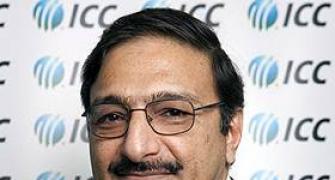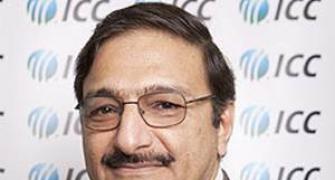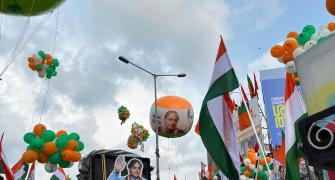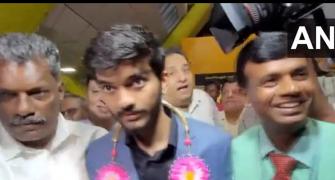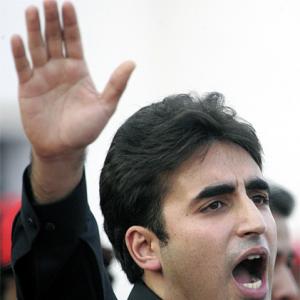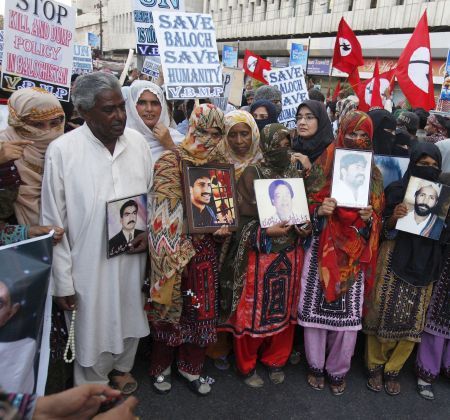 Protesting against enforced disappearances in Balochistan, Abdul Qadeer Baloch, 72, has led a small group that has covered more than 2,000 kilometres on foot, breaking the 84-year-old record set by Mahatma Gandhi during his Dandi march. Hamid Mir reports from Islamabad.
Protesting against enforced disappearances in Balochistan, Abdul Qadeer Baloch, 72, has led a small group that has covered more than 2,000 kilometres on foot, breaking the 84-year-old record set by Mahatma Gandhi during his Dandi march. Hamid Mir reports from Islamabad.
Abdul Qadeer Baloch, aged 72, and 11-year old Ali Haider Baloch are not aware that they have made history.
This old man and young boy have travelled more than 2,000 kilometers on foot along with a group of Baloch women and men on their way from Quetta to Islamabad.
The purpose of their non-violent long march was to raise voice against enforced disappearances in Balochistan. They broke the 84-year-old record of Mahatma Gandhi who traveled for 390 kilometers on foot from Ahmedabad to Dandi as part of his famous salt march.
Mahatma Gandhi was 61 years old when started his march to protest against the salt laws of the British government in the colonial India.
The youngest among the first 80 marchers with Gandhi was 18 years old. Gandhi opposed unjustified taxes on the production of salt and started disobedience by making salt himself.
Chinese leader Mao Zedong also started a long march in 1934 but this long march was actually a military retreat undertaken by the red army of the Communist Party.
There was no single long march but a series of marches because various parts of the red army in south China escaped to the north and the west.
The red army of 41-years-old Mao Zedong regrouped and then attacked Kuomintang. This long march was part of a military strategy. It was not a political long march.
The word “long march” was used and abused by many politicians after Mahatma Gandhi and Mao Zedong but nobody traveled on foot. Most of the politicians used vehicles in their long marches.
Late Benazir Bhutto even took a rail ride in her “long march” from Lahore to Islamabad against Nawaz Sharif government in 1992. She called off the march near Wazirabad when she was informed that President Ghulam Ishaq Khan had decided to demand resignation from Prime Minister Nawaz Sharif.
Again Nawaz Sharif also used the word long march in his Tehreek-e-Najat against Benazir Bhutto government in 1994.
The word long march was again used in lawyer’s movement for the restoration of deposed judges. Nawaz Sharif started his long march from Lahore to Islamabad in March 2009 but he was traveling in a jeep, not on foot.
The Asif Ali Zardari government communicated him a message through the then Army Chief General Kayani about the restoration of judges when he reached Gujranwala and the “long march” was called off.
When Mama Baloch announced his long march from Quetta to Karachi, many people never took him seriously. He is famous as Mama Qadeer Baloch. He is not protesting against any government laws; he is not demanding the resignation of prime minister and he is not demanding the illegal release of any prisoner. He has been campaigning for the recovery of missing persons since 2009 when his son Jalil was killed in the custody of secret agencies.
He initiated his campaign from the platform of Voice of Baloch Missing Persons and only demands production of missing persons in courts. He started his long march with some families of missing persons from Quetta on October 27, 2013.
Ali Haider Baloch stopped going to school and joined the long march with his elder sister Saba. His father Ramzan Baloch was abducted in front of the eyes of young Ali Haider. Farzana Majid Baloch is a well-educated woman. She did masters in bio-chemistry from Balochistan University and has been raising voice for the production of her younger brother Zakir Majid Baloch since 2009. She is secretary general of the VBMP and the moving spirit behind this historical long march.
Daughters of two missing doctors, Deen Muhammad Baloch and Akbar Marri, also joined this long march. The daughter of missing lawyer Haider Khan Baloch was disappointed in courts and joined the long march of Mama Qadeer Baloch along with some other women.
This small convoy completed 730 kilometers from Quetta to Karachi on foot in 27 days. They faced some problems near Khuzdar and the local administration asked Mama Qadeer Baloch to go back otherwise he will be attacked by miscreants. Mama Qadeer Baloch refused to surrender and continued his march. He was given a warm welcome in Wadh by BNP President Akhtar Mengal and then the guards of Mengal provided protection to Mama Qadeer Baloch till Hub.
The marchers were given big receptions in Hub and Layari. Ghinwa Bhutto, Syed Munawar Hasan and sister of Dr Afia Siddiqui were among those who expressed solidarity with the Baloch marchers. After reaching Karachi, VBMP set up a protest camp outside the Karachi Press Club for many days where National Party President Senator Hasil Bizinju also met Mama Qadeer Baloch and accepted that his chief minister in Balochistan, Dr Abdul Malick Baloch, was powerless to resolve the problem of missing persons.
Defense Minister Khawaja Muhammad Asif also visited this camp in December 2013 and assured Mama Qadeer Baloch that their dear ones will be produced in courts soon. The defence minister was unable to fulfill his promise.
Ignorance of government disappointed Mama Qadeer Baloch and he decided to continue his long march from Karachi to Islamabad. Some of his sympathizers opposed the idea of traveling on the roads of Punjab but Mama Qadeer Baloch said: “We must try to awake the people of Punjab because Punjab is Pakistan and only they can return us our thousands of missing persons”.
Mama Qadeer Baloch never faced any problems while crossing Sindh. Many Sindhi nationalist parties expressed solidarity with the marchers in different cities. The marchers started facing problems when they entered Punjab.
The convoy was first stopped in Multan and then in Okara. Armed people in uniform pointed guns at Farzana Majid Baloch and forced her to go back but she refused. Despite threats Seraiki nationalists openly supported the cause of Mama Qadeer Baloch in Multan.
When the marchers were crossing the lush green fields of Punjab a truck tried to hit the marchers near Renala Khurd. Two participants, including one female marcher, were injured but the march continued. When they reached Lahore only some human rights activists of HRCP, AHRC and left wing Awami Workers Party welcomed the marchers.
Chairperson of the Defence for Human Rights Amna Masood Janjua also welcomed the march of Mama Qadeer Baloch in Lahore along with the families of many missing persons from different areas of the Punjab. The so-called guardians of national interest advised many journalists in Lahore to stay away from Mama Qadeer Baloch. Lahorites actually missed the golden opportunity of removing misunderstandings between common Punjabis and the oppressed people of Balochistan.
Mama Qadeer Baloch again faced threats from the commandos of Punjab police near Gujrat. The marchers were asked to go back but they refused. They were not allowed to pass through the Gujrat city.
They were forced to go towards Gujrat bypass. Again they were threatened and abused near Sarai Alamgir by one dozen strangers in the presence of local police. When Mama Qadeer Baloch was passing through the garrison area of Jhelum, I joined him for few hours just to see the reaction of local population.
Most of the common Punjabis were not aware that why an old man from Balochistan was marching on the roads with some women and children. Some people offered drinks and water to the marchers but the police and security men in civil dress discouraged the locals.
Mama Qadeer told me that some common Punjabis offered them water, food and night stay at their homes but they were later threatened by the government agencies. Mama said: “We know that all the Punjabis are not bad but intelligence agencies never allowed them to even welcome us. It was against the culture of Punjab.”
Some Baloch students from Lahore and Islamabad joined the march just to give some protection to the small convoy but they used masks to hide their faces. They fear that intelligence agencies will create problems for their families in Balochistan. On the other hand, some intelligence operators traveling with marchers also using masks because they feared the media cameras.
Our media should give more coverage to these non-violent marchers as they don’t say they are against the constitution of Pakistan; they are only demanding implementation of Article 10 of the constitution which says that law enforcers must produce a suspect in the courts within 24 hours of his arrest.
Mama Qadeer Baloch traveled more than 1,400 kilometers from Karachi to the areas close to Islamabad along with his 7-year-old grandson. Many Baloch, Pakhtun and Sindhi parliamentarians are ready to receive him in Islamabad but these receptions are not solution to his problems. The solution is justice. He made history by traveling more than 2,000 kilometers from Quetta to Islamabad at the age of 72 just for justice.
The government sitting in Islamabad should not disappoint him because Islamabad is his last hope in Pakistan. If justice was denied to him then he will be forced to go to the UN Human Rights Commissioner in Geneva. Who will be responsible for giving a bad name to Pakistan when a 72-year-old man will talk to international media about missing persons in Geneva? What will happen? The powerful security agencies will declare Mama Qadeer Baloch a traitor. His grandson may also be declared a traitor but increasing the number of traitors cannot solve any problem.
Justice and rule of law is the ultimate solution to all the problems. Mama Qadeer Baloch spent this whole winter on the roads. He is coming to Islamabad in the hope of a spring. Don’t break his hopes.
Let it be a spring for him.
Image: Abdul Qadeer Baloch protests along with family members as his long march reaches Karachi from Quetta, in November, 2013
Photograph: Akhtar Soomro/Reuters
The article was first published in "The News International", a leading Pakistani daily


